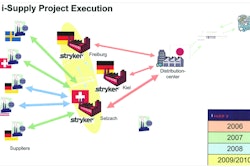
I’ve been pitching Africa as a supply chain growth imperative for a while now. And this past week, I spent two days moderating a CEO roundtable with leaders from eight big South African companies in Durbin, South Africa. The event was noteworthy because it comprised top bosses spending 12 hours together drilling into how supply chain affects business value. And I confirmed what I already presumed—now is the time for supply chain leaders pondering an Africa strategy to keep their cool.
Just before heading to South Africa, SCM World published a report entitled Africa: The Last Emerging Market. It examines lots of data and concludes that sub-Saharan Africa is a risky, but essential growth opportunity for many global businesses, especially those in consumer industries. In keeping with the universal truth that risk and reward move together, we concurrently have a Hollywood-scale scare overshadowing the discussion in the form of an Ebola epidemic.
Ebola is a truly horrible infectious disease that is usually fatal and currently in outbreak across western Africa. The number dead so far is nearly 2,800 and cases are spreading geographically. The current epidemic is also worrying in that it is active in contagion-friendly urban areas, whereas past outbreaks were isolated in rural locations.
While Ebola may be exceedingly nasty, it is not beyond the ability of a robust healthcare system to contain and subdue. Fatality rates are 90 percent when the disease is untreated, but are closer to 55 percent in this outbreak, according to a report by the Independent newspaper.
The fact is that this health crisis is less about an unbeatable disease than it is shortcomings in the supply chain.
One columnist, whose thesis is that health is a “basic human right,” expounded upon the lack of infrastructure needed to battle Ebola: “The infrastructure does not exist. And infrastructure is not just masks and gowns, but rules about when to use masks and gowns, trucks to bring new supplies of masks and gowns, a stockroom guy to keep track of supplies and order when things are low, a supplier with supplies, highways that are paved and dependable so the masks and gowns can get from here to there, cash on hand to keep equipment moving, and on and on—all of it is missing.”
To healthcare professionals, this challenge sounds insurmountable. To a supply chain architect, this is just another day at the office.
The good news is that consumer packaged goods companies worldwide are working on this right now—and not out of charity. Business opportunity drives them and the underlying economics of the region could mean that supply chain failures of this type fade into history over the coming decade. In fact, according to McKinsey, 128 million African households may qualify as emerging consumers or better within six years.
Some people say, “The best way to eat an elephant is one bite at a time.” Africa is our elephant and many supply chain leaders are ready to take a bite. In our recent chief supply chain officer (CSCO) survey, Nigeria ranked 10th overall as the country considered the best opportunity for growth.
Another four sub-Saharan countries made the top 40. In fact, 100 of the 1,053 respondents to the survey listed at least one African country among their top three growth prospects. Not exactly China, but hardly a lost cause.
Of course, risk and return move together, and our survey certainly flags Africa as awash in risk. To help sort it all out and choose where to take that first bite, our report offers a supply chain viability index that clusters countries strategically.
We may not be able to meet the Ebola threat effectively today, but 10 years from now, I believe it will be a different story.

















